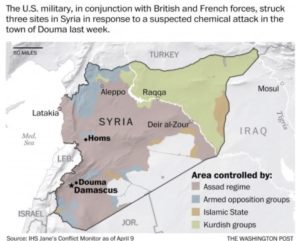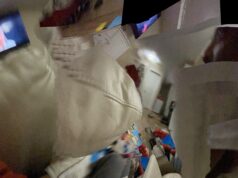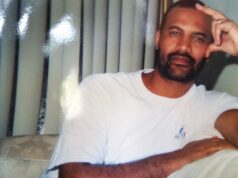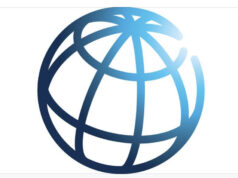Western allies warned Syria on Saturday that they could launch further attacks if chemical weapons are used again, even as Syria’s powerful backer Russia denounced the missile strikes but gave no signs of possible retaliation.
The flurry of statements after Friday’s coordinated strike of U.S. cruise missiles — along with launches from French and British forces — suggested a tense holding pattern.
The United States and its allies served notice to Bashar al-Assad’s regime that there was Western resolve to halt any further chemical attacks against civilians. Russia, meanwhile, said it did not mobilize its air defenses in Syria but underscored the importance of its military foothold in Syria and its role as Assad’s main protector.
For the moment, there were no signs that the worse fears would take shape: that the U.S.-led attack could put the United States and Russia in direct conflict.

Still, the extent of the blow to Assad’s regime remained unclear.
Gen. Joseph F. Dunford Jr., chairman of the Joint Chiefs of Staff, said the U.S., French and British forces struck three sites: a scientific research center near Damascus, a suspected chemical weapons storage facility near Homs and a storage facility and command post also near Homs.
But plans for the Western attack has been building for nearly a week, since a suspected chemical attack last Saturday on a rebel-held enclave east of Damascus. That offered Syria time to possibly move equipment and stockpiles.
On Saturday, France’s foreign minister echoed earlier threats from Washington that any further use of chemical agents by Syrian forces would bring more Western strikes.
Jean-Yves Le Drian said Friday’s attacks knocked out a “good part” of the Syrian government’s chemical weapons arsenal. He told BFM television that the immediate goal was achieved by the United States and others, but that another attack could come if the “red line is crossed again.”
In Moscow, Russian President Vladimir Putin and other top officials swiftly condemned the attack as international aggression but said no Russians were injured.
The Russian Defense Ministry reported that its forces did not mobilize its air defenses — giving further signals that the attack would not open up a wider crisis between the two former Cold War foes.
Russia further claimed that Syrian forces used older Soviet-made air defense systems to intercept incoming missiles. The Pentagon has given no immediate assessment on whether any missiles were taken down by air defenses.
In Syria, the Foreign Ministry described the missile strikes as “barbaric aggression.” Assad’s Twitter account showed a video of him walking calmly through marble corridors toward his office. Syria’s military claimed the attacks destroyed an educational center and research labs.
Hours earlier, civilians and soldiers gathered in Ummayad Square in Damascus for a show of support, waving Syrian flags and dancing to songs that praised the army.
In Tehran, Iran’s supreme leader Ayatollah Ali Khamenei called the attack a “crime” but gave no indication of any planned Iranian response. Iran and its main proxy force in the region, Lebanon’s Hezbollah, are both key allies of Syria.
The coordinated strike marked the second time in a little over a year that President Trump has used force against Assad, who U.S. officials believe has continued to test the West’s willingness to accept gruesome chemical attacks.
Trump, speaking from the White House late Friday, said the attack last weekend was “a significant escalation” of Assad’s use of chemical weapons and warranted a stepped-up international response.
The alleged chemical weapons use was not the work of “a man,” Trump said. It was “the crimes of a monster instead.”
Trump said the mandate for an allied attack was open-ended, but Pentagon chiefs later said the strikes Friday would be repeated only if Assad took further action that warranted a response.
The attack involved munitions fired from aircraft and naval vessels, including about 100 Tomahawk cruise missiles, according to a Defense Department official who spoke on the condition of anonymity to discuss operational details. The Pentagon also employed the B-1 strategic bomber.
The assault came despite the lack of a definitive independent finding that chemical weapons were used or who had deployed them. An initial team of inspectors had only arrived in Syria on Friday.
Defense Secretary Jim Mattis declined to say whether he thought the attack would prevent Assad from using chemical weapons again.
“Nothing is certain in these kinds of matters. However, we used a little over double the number of weapons this year than we used last year,” he said. “It was done on targets that we believed were selected to hurt the chemical weapons program. We confined it to the chemical weapons-type targets.”
Mattis said that to his knowledge there were no U.S. or allied losses from the strikes Friday.
Dunford said the only communications that took place between the United States and Russia before the operation were “the normal deconfliction of the airspace, the procedures that are in place for all of our operations in Syria.”
On Friday, the Russian ambassador to the United States, Anatoly Antonov, warned that “such actions will not be left without consequences. All responsibility for them rests with Washington, London and Paris.” Russian Foreign Ministry spokeswoman Maria Zakharova said the airstrikes represented the latest blow to the Syrian people “from those who claim to have moral leadership in this world.”
Russia seemed keen, however, to keep military tensions from escalating further. The Defense Ministry said that Russian air defense systems were not used to ward off the strike because the attacking cruise missiles did not enter the Russian systems’ “zone of responsibility” in the skies above Syria. The Russian Embassy in Damascus said it was not aware of any Russian casualties, Interfax reported.
British Prime Minister Theresa May issued a statement saying the attacks were a response to “circumstances of pure horror.”
The European Union voiced support for the allies. European Council President Donald Tusk tweeted, “The E.U. will stand with our allies on the side of justice.”
In the wake of last weekend’s gruesome attack, some U.S. officials advocated a larger, and therefore riskier, strike than the limited action Trump ordered in April 2017, also in response to suspected chemical weapons use.
That attack involved 59 Tomahawk missiles fired from two U.S. warships in the Mediterranean Sea. It fulfilled Trump’s vow that chemical weapons are a “red line” that he, unlike his predecessor Barack Obama, would not allow Assad to cross. But the airfield targeted by the Pentagon resumed operations shortly after the attack and, according to Western intelligence assessments, chemical attacks resumed.
Risks of the renewed attack include the possibility of a dangerous escalation with Russia, whose decision to send its military to Syria in 2015 reversed the course of the war in Assad’s favor. Since then, Russia has used Syria as a testing ground for some of its most sophisticated weaponry.
Since last year’s strike, multiple chemical attacks have been reported in opposition areas, most of them involving chlorine rather than the nerve agent sarin, as was used in 2017, suggesting the government may have adjusted its tactics.
Russia’s military had threatened to shoot down any U.S. missiles that put Russian lives at risk. Russia could also fire at the launch platforms used — potentially U.S. planes or ships. Russian officials had said U.S. and Russian military staffs remained in contact regarding Syria, even as Russian media carried stories in recent days about the potential outbreak of “World War III” as a consequence of a U.S. airstrike against Assad.
China’s Foreign Ministry said it opposed the use of force, urged negotiation and called for a “comprehensive, impartial and objective” investigation into the allegation that chemical weapons were used.

























